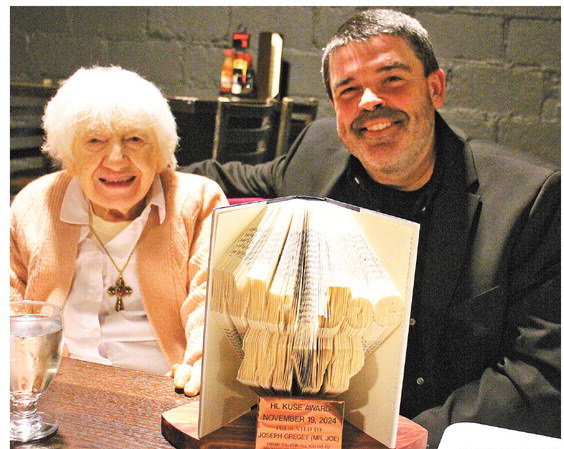COVID-19 tops list of stories covered in 2020
The following are some of the top stories in The Star News over the past year.
COVID-19
Taylor County Public Health Director Patty Krug and Medford Mayor Mike Wellner issued a joint statement in March that all non-essential gatherings of more than 250 people are to be suspended for 30 days following the lead of state health officials.
Under an executive order from Gov. Tony Evers, on March 16, that threshold was reduced to 50 people then on March 17 the threshold was reduced to 10 with sweeping restrictions closing schools and bars indefinitely and requiring restaurants to only do take out service.
The Wisconsin Department of Health Services (DHS) recommended that all non-essential gatherings of 10 or more people be cancelled or postponed statewide to help protect Wisconsinites from the spread of COVID-19, particularly those who are most vulnerable to infection and severe disease. DHS supported the decisions of any event organizers that elect to cancel or postpone events with less than 50 attendees in order to protect their communities.
The statement came when Gov. Tony Evers declared a public health emergency due to COVID-19.
The order included, but was not limited to mass gatherings at public or private schools, auditoriums, theaters, movie theaters, museums, stadiums, arenas, conference rooms, meeting halls, exhibition centers, taverns, health and fitness centers, recreation centers, licensed pools, and places of worship and religious gatherings.
On May 20, Taylor County has recorded its first confirmed case of COVID-19 when Krug announced that a Taylor County resident has tested positive for the virus. Taylor County had been one of two counties in the state to not have a confirmed case of the pandemic.
According to Krug, the individual who tested positive in the county had been in quarantine prior to testing positive because they had been identified as being exposed to an identified case elsewhere in northern Wisconsin. Under CDC guidelines for communicable diseases, people who are identified as being exposed to the virus are placed in selfquarantine for 14 days and are tested if they begin to show symptoms of the illness. The individual tested positive for the virus.
In August, Taylor County recorded its first COVID-19 related death.
On August 7, the Taylor County Health Department released a statement confirming the death of a county resident “associated with COVID-19.”
“It is with great sadness that we announce that one of Taylor County’s community members has passed away from complications associated with COVID-19. We extend our deepest sympathies to the family, friends, and community,” said Patty Krug, health officer. “We continue to face extraordinary circumstances and continue to urge everyone that this virus is real, it is deadly, and we must continue to follow safer practices including the use of face coverings and social distancing. We are in this together, and together we will overcome these challenges.”
High-speed internet On May 19, Taylor County took a major step forward in improving access to high speed internet for all county residents.
County board members voted unanimously to approve borrowing up to $9.5 million over the next five years in order to construct a “middle mile” backbone that will be a combination of countyowned fiber optic lines and transmission towers.
The vote was the culmination of about two years of work by the county’s broadband committee under the direction of committee chairman Mike Bub.
According to Bub, the county’s goal all along was to provide access to affordable, reliable internet service to all county residents by 2025. Bub highlighted concerns expressed in a county-wide survey about speed and connectivity issues with internet hindering the growth and development of the county.
Of counties in the state, Taylor County ranks second to the last for access to high speed internet. Bub said some parts of the county are well served but the less populated areas have little to no service creating a situation of “haves and have nots.” This digital divide became more apparent this spring with the COVID-19 pandemic causing schools to be closed. About 30% of Medford students are unable to access the internet from their home, even using school-issued chromebooks and other devices.
Bub explained the goal is to build the middle mile network which will serve as a backbone and will allow private internet service provider (ISP) companies to lease space on the lines in order to sell internet service to customers. Initially the county had looked at a completely fiber network, however, Bub noted that with advances in wireless technology it will be a combination of the two. He also explained that they had no intention of duplicating service already offered by TDS Telecom or other companies, but are seeking to make it cost effective to fill in the gaps.
Under the county’s plan, the county would set up a corporation that is owned by the county. It is this corporation that will contract for the installation and maintenance of the lines and equipment as well as enter into lease agreements with private ISPs. Over time, revenue generated from the leases would come back to the county and pay off the construction cost. Bub projected a total payoff time of under 20 years. Another benefi t of setting it up this way, is the county could potentially sell off the lines if they were approached by an outside company wishing to do so.
The timing for action now was to have the county’s commitment to the project so that in October ISP companies could bid on census blocks to receive federal subsidies to provide services to rural areas across the county. In addition, the interest rates are near historic lows. County finance director Larry Brandl was told by the county’s bond advisors that they would likely be able to borrow for around 2% interest rate. In addition, Brandl said the county will have all its existing debt paid off in 2022. This gives the option to work these new debt service payments in under the existing tax
levy.
Kwik Trip stores
The city of Medford cleared the final hurdle for the planned south side Kwik Trip to be built.
Members of the Medford Planning Commission on May 26 approved a final site plan for the convenience store and gas station. It will be located at the northeast corner of the Hwy 13 and Perkins St. intersection. Looking back on top stories from 2020 as reported in The Star News
Continued from page 1
According to Scott Teigen of Kwik Trip, the building will be oriented to be facing south toward Perkins with the main entry off that road. He explained there is an existing easement for a sewer lateral which serves the Medford Coopertive property to the north, which runs through the property. He said Kwik Trip had offered to relocate the lateral, but an agreement with the Medford Cooperative could not be reached so they went with the layout. “It was totally up to them,” he said, noting Kwik Trip had no problems with being south facing on the parcel.
He said the company is finalizing work with the state department of transportation for the driveway access onto Hwy 13. He noted that in the plans, the state had reduced the number of driveways on Hwy 13 from two to one.
The store is one of two new Kwik Trip stores planned to be built in Medford. A north side Kwik Trip will be built in the area where the former Shay Creek Sports building is currently located.
According to Teigen demolition and site preparation will take place this fall for both locations with construction set to begin in spring 2021. He said both locations in the city will be built at the same time with about a twoweek stagger between them to allow for crews to move from one site to the other.
He anticipated the stores to open by the end of summer 2021. At which time, he said the existing store located at Clark St. and Hwy 13 will be closed and prepared for sale.
Dam projects
The Taylor County Forestry Committee at its meeting July 6 agreed to wait two years and reapply for grant funding to replace the Camp 8 and Chelsea Lake dams.
The county had applied for 50/50 grant funding to replace the sluice gate on Miller Dam and the dams at Camp 8 and Chelsea. The Miller Dam project was approved for funding, but the county lost out on grants for the other two projects.
Projects are awarded points based on a range of criteria with projects with higher points getting funding first. The grant application for the Camp 8 project was docked 20 points because Ayres Associates failed to comply with a section requiring project plans to be submitted 30 days prior to the February 28 grant deadline. This caused the project to miss being funded by one point. Forest administrator Jake Walcisak said he had appealed the points and ranking decision for both the Camp 8 and Chelsea Lake dams with Tanya Lourigan, head dam safety engineer with the Department of Natural Resources (DNR), but the appeal was turned down.
Walcisak said he had contacted the DNR and they approved his request to extend the directive concerning the spillway on the Camp 8 dam for two years. He said this will allow for the county to apply for funding in the next grant application cycle without missing a directive, which would cost the county points on the application. Walcisak said the county will also have to do a spillway realignment and put up a new sign in order to keep the dam in compliance.
Walcisak said there is nothing about either the Camp 8 or Chelsea dams to indicate they are in emanate danger of failing. He said they are in very poor condition, but not to the point that the county needs to talk immediate action. Walcisak said if the dams were to reach that point, the DNR would issue an order for the county to lower the lake to a specific level and maintain that level until the dam is replaced.
Walcisak said the DNR has also granted a request to extend the directives for the Chelsea Lake Dam by two years. He said this will give the county a fresh set of directives from the time it took ownership of the dam in 2018 rather than inheriting directives from the previous owner that were already two years old. Walcisak said by updating the dam’s Emergency Action Plan and making other changes, he expects the county will be able to gain back points it lost when it files the next grant application.
*** At the October 9 forestry committee meeting, chairman Chuck Zenner presented information to members of the Taylor County Forestry committee from a meeting held between county representatives and Chelsea Lake property owners on Sept. 24.
With the dam replacement project delayed due to the county being unsuccessful in getting grant funds, lake property owners are renewing their calls for the county to take over ownership and maintenance of dikes along the shoreline and raise the water level to what it was when the county took over ownership of the dam in 2017. At the meeting where the county approved taking over the dam, county board members specifically acted to exclude the dikes.
Because the dikes were never under any DNR permit or on any type of record, the DNR has considered them parts of the natural shoreline. Some property owners would like to see that changed and have the county take over maintenance of the areas and use that to petition the DNR to raise the water level.
Forest administrator Jake Walcisak reported the results of a survey completed by 19 of the 23 lake property owners including the town of Westboro and the county in regard to operation of the lake, the interest in raising water levels and their willingness to contribute to the expenses.
According to Walcisak, the survey shows that while 79% of the respondents felt the water level before county ownership met their needs, 58% responded that the current level meets their needs. The margin becomes closer when the town and county responses are taken out of the survey with nine OK with the current water level and eight unhappy with it. Even more telling is the response to a question of if they would be willing to contribute through a lake district or special assessment to increase the water level. To that question five were yes, including the county. Nine were opposed to the idea and five, including the town of Westboro, were undecided.
A lake district is a formal government entity with representatives from the lake owners and the local municipality. The district would own the dam and have the authority to levy taxes on the lake district in order to pay for upkeep of the dam and other projects.
Taylor County and the forestry committee specifically have long gone on record supporting the creation of a lake district, even going so far as offer to cover the legal fees needed to set it up. If the district was formed, the county, which owns shoreline at a county park there, would be responsible for a share of the expenses.
“If a lake district is formed we will pay our fair share, but not beyond that,” Zenner said. The county remains committed to replacing Cheslea Dam and keeping the water level at the current permit elevation of 1,531 feet. Medford school referendum A proposed $39.9 million high school renovation project will go to voters.
Members of the Medford School Board voted unanimously in July to approve putting a referendum question on the Nov. 3 general election ballot asking voters to approve the plan.
The proposed project includes the construction of additional classroom space with focus on science, technology, art and mathematics areas as well as reconfiguring the existing library space and current theater space into collaboration areas, expansion of the school office with security upgrades for the building entrance, and the construction of a new 500-seat theater and a gym on the west side of the building.
According to district finance director Audra Brooks, the projected tax impact of a $39.9 million project is estimated at $53 a year on a $100,000 home. This is about $25 less than the projected cost that was included in the survey question sent out in the spring. It is based on an estimated 3% interest rate. This interest rate is considered a conservative number given the strong demand for municipal debt issues in the bond market.
In November, voters in the Medford Area Public School District narrowly defeated a proposed $39.9 million referendum to make major expansion and renovations to the Medford Area Senior High School building. Just 148 votes separated the 3,531 (51%) who voted against the referendum from the 3,383 (49%) who voted for it.
Voters in the Medford school district will get a second chance to weigh in on a proposed $39.9 million package of high school renovations.
After nearly an hour of discussion, school board members voted unanimously at its meeting on December 21 to send the same referendum back to voters for the April 6 spring election.
In the month prior to the board meeting, school board members and administrators made several hundred phone calls to area residents asking for input on the referendum project and why people either opposed it or supported it. They also asked residents if the district should try again.
See next week’s issue for top court stories of 2020
Chris Goodwin, water resources manager for Ayres Associates, agreed with the county holding off to see if the dam grant program is renewed before settling over the company’s mistake in not following the instructions for applying for grants last winter.
BRIAN WILSON/THE STAR NEWS



